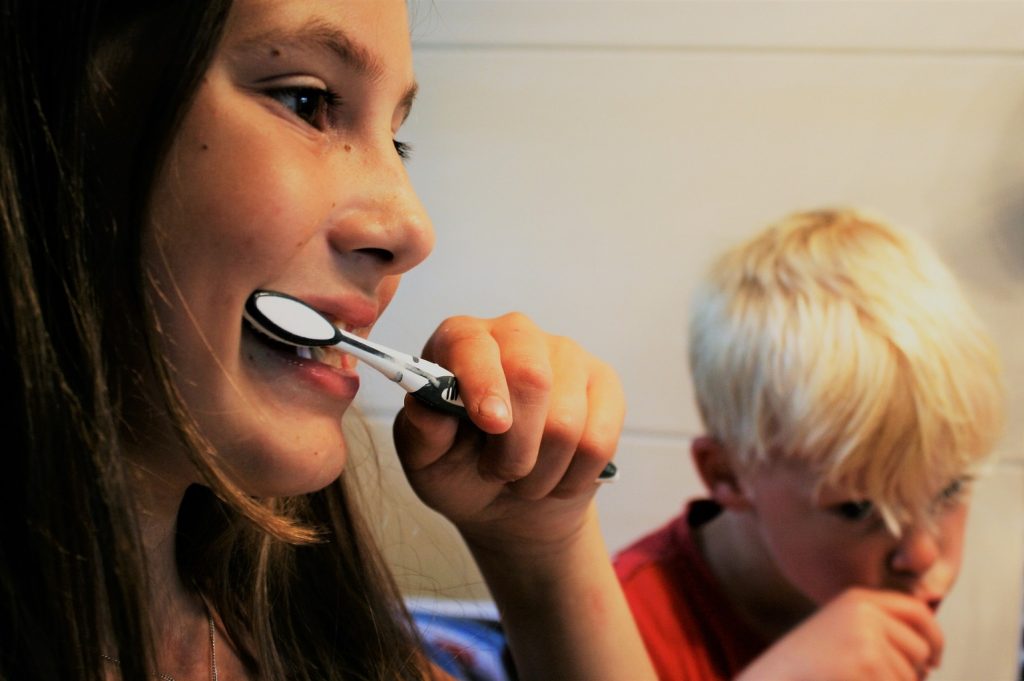How do you make sure an adult has a good oral care regime? You teach him or her when they’re still little. Healthy teeth are important to the child’s overall health, and good oral care in kids will help set good dental habits as they grow. If a child is not too happy about the daily wiggling of a brush in his mouth, it can be a bit difficult… but not impossible.
1. Start Early
Don’t wait for a mouth of 20 baby teeth to start brushing. As soon as the baby’s first tooth comes in, start brushing it after the last feed before bed. You can use your finger instead of the brush. That can help the baby get used to something being in the mouth and touching the gums.
2. Be a Role Model
Children try to imitate adults and copy everything they do. So instead of making them brush their teeth or just brushing for them, make this a family activity. Let the kids watch you, or their older siblings, do it. Of course they want to be just like mamma! Or the big sister.
3. But Make Sure They Learn the Technique
When they’re little, children lack fine motor skills. Brush for them in the beginning; then supervise what you do, because they need to be doing this correctly. You don’t want them to press too hard, and teach them brushing in a circular motion rather than up and down.
4. Give Them Control
Some kids will not like the practice, and that’s something you will need to overcome. For example, let them choose the toothbrush that’s brightly colored or features a favorite cartoon character – there are endless options on the market, and a fun toothbrush for kids can be a real helper for those little reluctant brushers. Or you can offer them several different kinds of toothpaste and let them choose the taste. Children like being in control, and having their opinion matter will likely make brushing something to look forward to.
5. Time Them
Mastering the technique is only half of the process; the other half is not quitting after two strokes. To make sure the brushing lasts for 2 minutes, use a timer they can look at, or play a song that lasts about that time.
6. Introduce the Floss
As soon as the teeth begin fitting closely together, introduce the habit of flossing. This is important to help stop the build-up of plaque. If you’re not sure how to help, ask the dentist about the right techniques – but basically, you should teach them to slide the flow between their teeth and fingers, and curve it around the tooth, then move up and back down again.
7. Be Wary of Their Sugar Intake
Children love sweets, junk and sodas – but they should only have very limited amounts of those. A lot of sugar is directly linked to the risk of cavities, and that’s something that can be easily avoided by limiting sweet snacks and desserts. Do not let them get used to sugarydrinks – opt for water instead.
9. Make the Dentist Their Friend
We’re well aware that not even many adults are friends with their dentists; but it’s especially important to not instill fear in your child about the dental check-ups. Take them to the dentist before their first birthday, and continue with biannual check-ups. Encourage them to say “aaah” and congratulate them for being a good patient. Give them a reward – but not in the form of a sweet. A golden star will do, or a visit to a special playground.
Children who develop good dental habits have greater chances of never having a filling later in life, not to mention other dental issues that can be easily prevented. While they might be reluctant to brush regularly in the beginning, apply these tips and you’ll get a kid eager to show off his pearly whites anytime!
Bio:
Helen Bradford is a journalism student who always seeks new ideas to write about. She enjoys blogging about beauty, health and style trends for women. When she’s not writing, she spends her spare time being active through fitness and traveling.


Comments are closed.